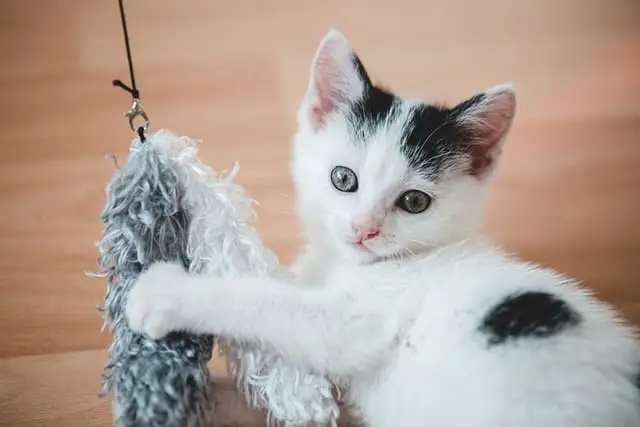
Knowing how the cat’s mind works is fundamental to building the relationship with cat: here is everything that science has revealed about it.
Raise your hand if you have not found yourself observing your cat while looking absorbed out of the window or when you decide to sit on your computer just when you need to use it, wondering: “what is he thinking about?”. Anyone who has adopted a cat would like to know how the mind of these domestic cats works, to try to understand them better and relate to them in order to create a more peaceful coexistence and a deeper affection.
The cat’s brain is not so different in structure from that of the human brain: it is slightly smaller than that of other mammals, but it is organized in the cortex and brain lobes exactly like ours. A cat has its own cognitive capacity, is responsible for its decision-making process, interacts and relates to its emotional intelligence and communication skills with other animals and humans.
But how exactly does the cat’s mind work? What do our beloved domestic felines think and how do they make decisions? In this article, we analyze the most important scientific discoveries on the functioning of the feline mind.
How does the cat’s mind work? The opinion of scientists
Cat owners are very interested in understanding why cats do what they do and therefore understanding how they think and how they work. their minds and their brains. The cause of this curiosity is probably hidden in the halo of mystery that has always surrounded domestic felines, notoriously independent and sometimes somewhat detached, despite having been domesticated for millennia.
In the past, cats were considered as “simpler” and less demanding pets to manage than dogs: today we know that this is not the case. A cat needs love and dedication, time with its human family and can be trained to do many things.
But how do cats relate to people and how does it affect the functioning of their mind and cognition in the cat-human relationship? We will try to answer in the next paragraphs.
How does the cat interact with humans?
Even if they hunt alone and love to explore the world in solitude, cats are still social animals and interact with their own kind, with other pets but above all with the man with whom they can establish a very deep emotional relationship.
We are used to thinking of the dog as a faithful friend of man, but in reality even the cat can be a loyal and affectionate friend. He just needs more time to get acquainted with the home environment and with the people who live there.
Once a connection has been established, it is scientifically proven that cats see humans as a “social reference” and turn to the person they trust for their own needs and requirements not only in terms of food, but in general care. A scientific research carried out a few years ago, for example, showed that when a cat gets scared, his mind is activated in search of the owner: cats look for humans when they need to feel safe.
Furthermore, exactly as it happens with dogs, it should be emphasized that cats can read the body language and facial expressions of people to accurately recognize the emotions and moods of human beings: not to mention their ability.
Do cats recognize voices?
Yes, cats are able to recognize the voice of their favorite human: they know very well if it was a stranger who pronounced their name or not. The answer is very clear from the cat’s physical reactions: when a known person pronounces his name, the cat moves its ears or head and sometimes walks to reach the source of the call.
Speaking of voices and vocalizations, vocal communication has a great importance in feline intelligence: the brain of an adult cat is able to process up to 16 different types of meow, each with a specific meaning. The most surprising and still little known thing is that cats meow to communicate with people, and not with their own kind: usually, a shrill and high pitched meow says “I’m hungry”, while the purr indicates a pleasant situation. To learn more about this topic, discover all the sounds of cats and the possible meanings of feline purring in our in-depth articles.
What emotions does the cat feel?
If we want to deepen the theme of the functioning of the feline brain, we cannot ignore that part of the cat’s mind that serves a cat to feel emotions: the emotional intelligence of a cat is much richer in nuances than what we can think!
For example, cats feel anger – woe betide trying to force a reluctant cat to do something it doesn’t want to! Fortunately, however, they do not feel a grudge and even if we make them angry at the moment they will not try to punish us. Sometimes people tend to humanize the behavior of their four-legged friends, thinking that cats or dogs are mischievous: it is absolutely not possible, because their mind is not able to track the behavior of others to act accordingly.
Similarly, cats do not feel guilty: the apparently guilty look of a kitty when he does some trouble, for example when he pees on the carpet, is actually the frightened look of a feline that senses your anger but cannot understand how you will react.
Finally, just like in humans, the cat’s mind is capable of experiencing and processing feelings of joy and sadness: cats suffer from loneliness and lack of attention or can be happy when they are relaxed, when we play with them, when they eat a greedy morsel.
How the cat’s mind works age by age

As previously mentioned, a cat’s brain is equipped with a cerebral cortex which is responsible for the cat’s decision making, learning, and short and long term memories. To complete our in-depth study on the functioning of the feline brain and understand what a cat thinks, it is interesting to analyze the mind of a cat in the various stages of age: from the puppy kitten, through the adult cat to the cat’s old age.
The kitten’s brain
In kittens the cerebral cortex plays a critical role in the development of the little one, as memory shapes almost all the learning ability: a kitten mentally takes note of everything it sees and in particular of what the other cats in the house do, pets and the human family. The comparison with other living beings is fundamental for the correct cognitive and behavioral development of the cat: this is the phase of socialization of the kitten.
Sometimes, kittens at this age are very shy and tend to stay a little aloof: don’t worry, because kittens are skilled and attentive observers and it is by looking around that they learn. What you can do at this stage to help him overcome shyness a little is to try to convince him, very gently and without ever forcing him, to play with interactive toys.
The mind of the adult cat
As the puppy enters adulthood, he continues to learn and shape his mind through observation and repetition of what he sees and experiences around him. A cat knows exactly where to keep its food and there are tons of specimens waiting in front of the cabinet until you get to fill the bowl. In adulthood, the cat’s mind works through the various areas of the brain and the interconnections that bind them.
Adult cats can sometimes become particularly stressed in the face of novelty and sudden changes, showing difficulty in understanding and adapting to new situations. Their brains need some time to get used to, so there is nothing to worry about.
Be careful, however, if the adult cat is unable to remember the arrangement of furniture and objects or if it presents sudden changes in personality: it is likely that the cat has a neurological disease and should be immediately taken to the vet.
What do older cats think
The brain of an older cat can exhibit typical symptoms and signs of aging just like humans do. It is necessary to learn to recognize the symptoms of cognitive disorders that can affect the functioning of the cat’s mind and its quality of life. Here is a list:
– decreased interaction with humans and other pets,
– decreased appetite,
– the cat goes to the toilet outside the litter box,
– changes in the sleep-wake cycle,
– the cat seems confused and unaware,
– the cat cries and complains a lot, especially at night.
Even if old age can bring some health problems to cats, it is possible to better face this delicate phase with the necessary precautions in terms of healthy nutrition and safety precautions. Also, never neglect the physical and mental stimulation in your cat: there are games suitable for older cats, to keep his body and brain active.






